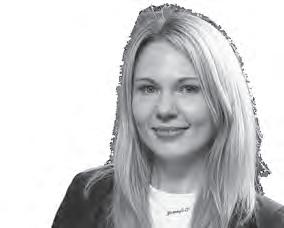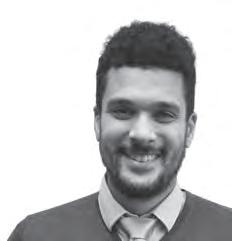
7 minute read
USING TRANSFERRABLE SKILLS TO FOLLOW THE PATH LESS TRAVELLED
USING TRANSFERABLE SKILLS TO FOLLOW THE PATH LESS TRAVELLED
Careers rarely follow the path we think they’re going to, meaning many of us end up with jobs that we never expected to have, or didn’t even exist when we entered the job market. A recent survey by Slack revealed that a third of UK workers planned to change jobs in 2022, in a trend that’s been branded the ‘Great Resignation’. As employees gain transferable skills and our current roles evolve, more and more people are finding themselves in unconventional routes to new positions.
Advertisement
CHLOE ANGUS, A PERSONAL DEVELOPMENT COACH, TOLD US ABOUT HOW SHE FOUND HERSELF WHERE SHE IS.
How did you follow the conventional route?
I suppose I was driven by societal expectations to get my A-Levels and go to university. I got an admin job straight after university back in Sheffield, in an engineering firm. I enjoyed the fact that my dad was originally in engineering so it felt nice to be part of South Yorkshire’s successful modern engineering team. After multiple promotions I left after 15 years in December 2020, holding the role of head of global customer service for a £200 million turnover company.
Why the switch?
Despite doing well, I realised I wasn’t happy - I was effectively burned out. The reflective work I did helped me to realise what was important to me and without knowing what was next, I handed my notice in. My passion was always people and communication. I took my coaching qualification in January and set up my coaching and training company in April 2021. I then started working part time for Cavendish Cancer Care as corporate wellbeing manager shortly after.
Why did this work for me?
I would say there are two main elements to this. Firstly, all the work I am doing is aligned to my values and what is important to me. It gives me true satisfaction. I often cannot believe that I can help people look after their wellbeing and have confidence in themselves, while helping fund important therapy for those affected by cancer in the local area. Secondly, I can be more intentional with my time and my energy. I enjoy the mix of working alone and with others and that each day can be so different. It encourages me to make time for me whether that’s connecting with others, exercising or reading.
My thoughts on transferable skills?
There are transferable skills that have helped with my transition from full-time employed role to a part time and self-employed set up. The key skills are communication, confidence at all levels, negotiation and emotional intelligence and management. I have always been curious, asked lots of questions and wanted to understand more about people and organisations. This has also helped as it gave me a general understanding of many areas, not just expert knowledge of my own specific role and industry.
JEN BEAL, CEO OF HRM, TALKED US THROUGH HER CAREER CHANGE FROM PROPERTY TO PR.
Can you give a brief overview of your career change?
After 15 years working within the property industry in various roles, I was presented with an opportunity earlier this year to step into the CEO role at HRM | PR & Creative, the region’s longestestablished PR agency.
Undoubtedly, the move was a significant shift for me, transitioning from an industry I knew inside out to something new with its own set of challenges. My successful track record of managing teams and client relationships, combined with my experience in marketing and branding, gave me a solid foundation for the second chapter in my career.
Which transferable skills did your previous role equip you with, and why are these useful in your current role?
My career in property, coupled with my degree in Communication Studies, has helped no end with my ability to communicate effectively, both in writing and in person. Dealing with the public and, often demanding, clients has also taught me how to problem solve and negotiate, helping to turn challenging situations around to a mutually satisfactory outcome. In my role at HRM, I draw these skills daily as I navigate the landscape of running a successful business.
The interpersonal and management skills that I’ve been equipped with are invaluable when interacting with clients and my team, whether that be leading productive meetings, dealing with contract negotiations, building strong client relationships, interviewing prospective new employees, or motivating and supporting the team.
How important are transferable skills in the workplace?
Soft transferable skills such as communicating well, being organised, prioritising effectively, and demonstrating creativity in how you approach a situation are essential to me as an employer. It’s a bonus when you have someone with relevant experience looking to work for you, but above all else, I look for people with transferable key skills as we can teach the rest!
How do you encourage your team to develop these?
One thing I haven’t yet mentioned is personal accountability, the ability to take ownership of one’s actions and performance. This is the most important skill I look for and encourage within the team. At HRM, we consider individual success to be our own responsibility, so we actively seek ways to learn new things and improve our transferable skills.
I like to spend time with everyone, discussing their key strengths and highlighting the areas which need work. These can sometimes be the transferable skills I have discussed above, such as building confidence in face-to-face meetings, so we work together to develop these using a combination of in-house workshops and mentoring. NICHOLAS BRENNAN TALKED ABOUT HIS PATH FROM BANKING TO DIRECTOR OF LODESTONE RECRUITMENT.

Can you summarise why you switched careers, from and to, and what it meant to you?
I left banking in 2014 to pursue a lifelong dream of travelling. I had been wanting to do this for a while and at the age of 28, I decided to quit my job and go out to Asia. When I arrived back, I wasn’t sure what to do, but I knew my skills were in sales and building relationships. My friend said that his company were doing interviews for trainee recruitment consultants, and I sort of fell into the sector.
It was very different, as it was a niche sector involving engineering, manufacturing and technical work, and I have no background in this. It meant starting again by building a desk and platform to win clients, working with some great people in finding them new jobs, as well as building a fair amount of technical knowledge about engineering, some of which I am still learning today.
After six years at one company, I felt that I had more to give and wanted a new challenge. I set up Lodestone Recruitment, after a burning desire to work for myself and do things my way. This was particularly a challenge as we were still in recession!
What stood out from your journey?
I always trusted that I could sell and generate revenue but was unsure whether I had the knowledge to set up a business successfully. I had built up so many walls thinking I wasn’t capable or couldn’t do it, but 21 months in and I am proud to say that I have a respectable business in the sector.
Why did this work for you?
I think belief in yourself is the key. I speak to so many people and business owners who say the same thing. If you put in the hard work in and do a good job, the results and success will follow.
Tell us about how you see transferable skills sitting within this - and how important transferable skills were for you and your journey.
With banking I found real joy in working with customers to help them save money and as a result, I built some really good relationships. That has served me well in my recruitment career.
In banking, I would be keen to help customers either save money or reduce debts. I was able to transfer these problem solving skills from banking into recruitment. With recruitment, I try to understand the job seeker and what companies would be a good fit for their skills, or find out a culture of a company in order to find the best talent that would suit their next stage of growth.
Previously, I would have clients with extensive knowledge of banking, but also people with little or no knowledge meaning I quickly developed good communication skills. I used these skills in recruitment to convey information in an easy-to-understand, jargon-free, and yet professional way. Being able to communicate with people from all walks of life is key to developing relationships.

